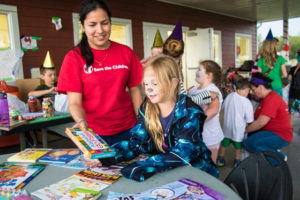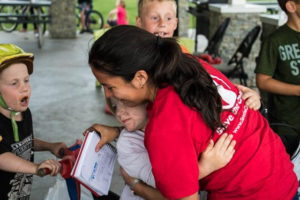Meet our Programs Officer, Carmen!
This month, we talked to Carmen Barrientos Martinez, programs officer for the National Reconciliation Program, about gender equality in the development sector. Here’s what she had to tell us:
What does gender equality mean to you?
For me, it means that everyone is treated equally. It means being fair and just, disregarding any biases that you might have. It means everyone has access to the same opportunities, and the same chances to succeed in those opportunities. It means a world in which there is no fear to be who you are, no matter what you look like and/or what your preferences are.
Gender equality is seeing everyone as a human being first, before any gender association.
What difference do you feel the female voice makes in the non-governmental organization (NGO) sector?

What difference doesn’t it make? The voice of a female is as important as the voice of any human being in the NGO sector (and any other sector). It brings in a diversity of thought, an opportunity to grow, and a chance at understanding others and empathizing with varied ways of thinking, experiences, values and beliefs. The female voice also helps ensure equality and equity in what we create and how we create it, most importantly, that programming is best fit and most relevant to those being directly impacted.
How does Jebb’s past inspire your work today?
My constant inspiration is the children, youth and families that continue to fight for their survival. What has motivated me in my work, is wanting to make a difference in unjust treatments and situations. I believe, like Eglantyne Jebb and many other passionate activists, our first reaction to injustice is disbelief, then anger, then the desire to change it, growing into the commitment of changing it no matter what – because it’s the right thing to do! First and foremost, it’s about being a good human being and caring for each other.
What do you hope we can achieve in the next 100 years?
In the next 100 years, I hope we get to a place of no longer needing NGOs, like Save the Children. That individuals can come together and make conscious decisions on how they would like to see their world; I hope of a day with no poverty or inequalities. In the next 100 years, I hope for fairness, an updated definition of what success looks like, affordable and equal access to healthcare, value for those professions that help others, working together, a flexible system for education that considers and values youth and children’s voices, and a renewed sense of caring for one-another. And, it’s not just about humans: our environment is a precious, living being, that also has rights and needs to be taken care of, and not exploited.
Though, I know these ambitions are large, more realistically in the next 100 years, I at least hope for an improvement to the status quo. Empowered communities, a central consideration for the environment and empowered individuals who are committed to the greater wellbeing are critical.
What message do you have for women and girls (in Canada or around the world)?

The situation for women and girls in Canada and around the world, continues to be a challenging one; in some countries, more so than others. Unfortunately, without the proper support it becomes harder to change the situation. Power is not easily relinquished by those in control of it. As a general observation, humans fear the unknown and fear losing power to keep things the way they like it. To change the status quo, women, girls and anyone else affected by discrimination and/or inequalities and inequities, need to work together and not give up. Sometimes, you only need one person to be fearless, speak up, and stand up for what they believe in; one person to go against it all and do what they know is right (and right for themselves). My message to women and girls is to keep true to your values and ethics, and find your voice to always do what’s right for you!


